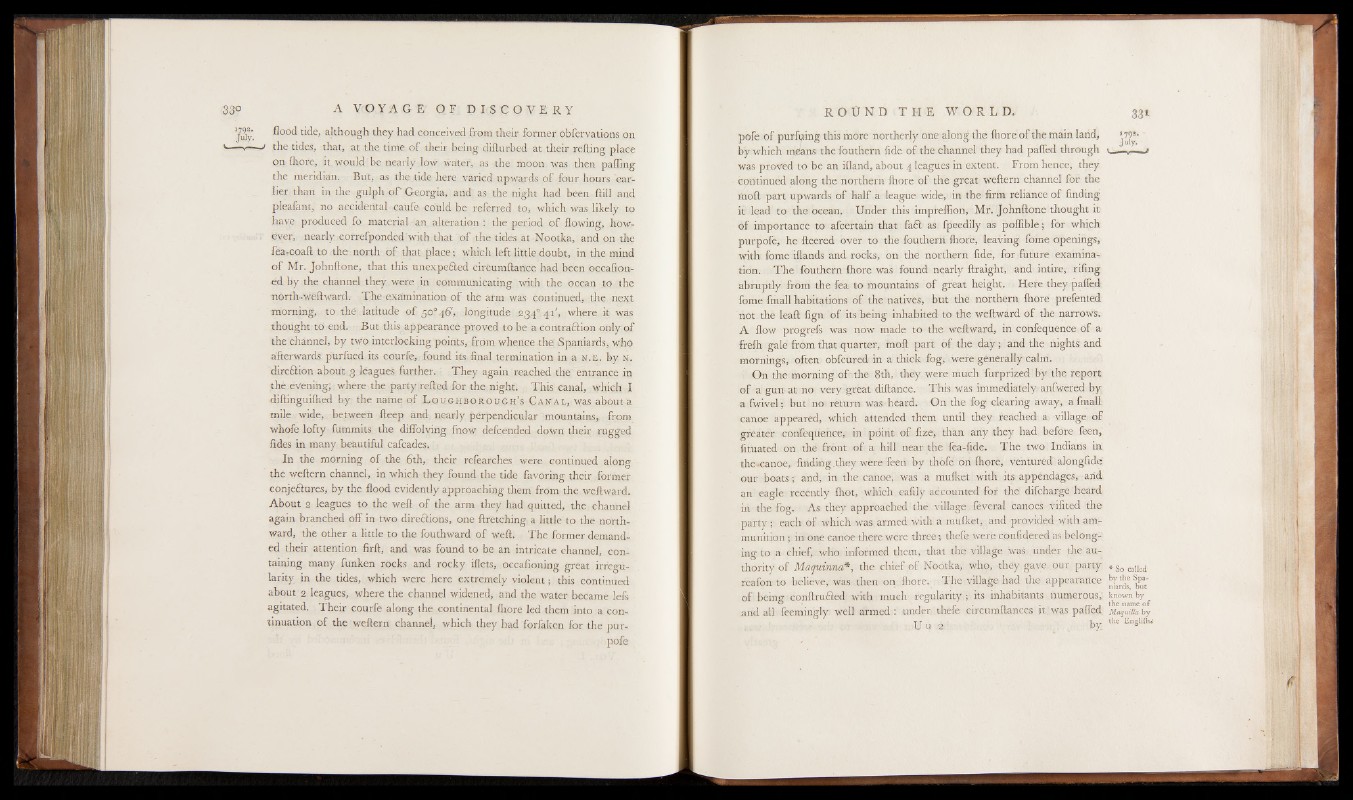
July' fl°oc* tide, although they had conceived from their former obfervations on
t. — the tides, that, at the time of their being difturbed at their refting place
on fhore, it. would be nearly low water, as the moon was then pafling
the meridian. But, as the .tide here varied upwards of four hours earlier
than in the gulph of' Georgia, and as the night had been ftill and
pleafant, no accidental caufe could be referred to, which was likely to
have produced fo material -an alteration : the period of flowing, how-
. ever, nearly, correfponded'with that o f the tides at Nootka, and on the
fea-coaft to .the north o f that place; which left little doubt, in the mind
of Mr. Johnftone, that this Unexpefted circumftari.ee had been occafion-
ed by the channel they were in communicating with the ocean to the
north-weftward. The examination of the arm was continued, the next
morning, to thé:. latitude of. 50° 4(7, longitude 234° 41', where it was
thought to end. But this appearance proved to be a contra&ion only o f
the channel, by two interlocking points, from whence the Spaniards, who
afterwards purfued.its courfe, found its final termination in a N .È. by N.
direSion about 3 leagues further. They again reached the entrance in
the evening; where the party felted for the night. This canal, which I
diltinguilhed by the name of L o u g h b o r o u g h ’ s C a n a l , was about a
mile wide, between fteep and nearly perpendicular mountains, from
whofe lofty fummits the diflolving fnow defcended down their rugged
fides in many beautiful cafcades.
In the morning o f the 6th, their refearches were continued along
the weftern channel, in which they found the tide favoring their former
conjectures, by the flood evidently approaching them from the weft ward.
About 2 leagues to the weft of the arm they had. quitted, the channel
again branched off in two directions, one ftretching a little to the northward,
the other a little to the fouthward of weft. The former demanded
their attention firft, and was found to be an intricate channel, containing
many funken rocks and rocky iflets, occafioning great irregularity
in the tides, which were here extremely violent; this continued
about 2 leagues, where the channel widened, and the water became lels
agitated. Their courfe along the continental flare led them into a continuation
of the weftern channel, which they had forfaken for the purpofe
R O Ü N D T H E W O R L D . 33t
pofe of purfuing this more northerly one along the flare o f the main land,
by which means the fouthern fide of the channel they had paffed through
was proved to be an ifland, about 4 leagues in extent. From hence, they
continued along the northern flare o f the great weftern channel for the
moft part upwards of half a league wide, in the firm reliance of finding
it lead to the ocean. Under this impreflion, Mr. Johnftone thought it
o f importance to afcertain that faft as fpeedily as poflible; for which
purpofe, he fteered over to the fouthern flare, leaving fome openings,
with fome iflands and. rocks, on the northern fide, for future examination.
The fouthern flare was found nearly ftraight, and intire, riling
abruptly from the fea to mountains of great height. Here they paffed
fome fmall habitations o f the natives, but the northern flare prefented
not the leaft fign of its being inhabited to the weftward of the narrows.
A flow progrefs was now made to the weftward, in confequence o f a
frelh gale from that quarter, moft part of the d ay; and the nights and
mornings, often obfcured in a thick fog, were generally calm.
On the morning of-the 8th, they, were much furprized by the report
o f a gun at no very great diftance. This was immediately anfwered by
a fwivel; but no return was -heard. On the fog clearing away, a fmall
canoe appeared, which attended them until they reached a village of
greater confequence, in point of fize, titan any they had before feen,
fituated on the front of a hill near the fea-fide. The two! Indians in
the-canoe, finding.they were feen by thofe on fhore, ventured alongfide
our boats; and, in the canoe, was a mufket with its appendages, arid
an eagle recently lhot, which eafily accounted for the' difcharge heard
in the fog. As they approached the village. feveral canoeS vifited the
party ; each of which was armed with a mulket, and provided with ammunition
; in one canoe there were three; thefe were cqnfidered as belonging
to a chief, who informed them, that the village was. under the authority
of Maquinna*, the chief of Nootka, who, they gave, our party
reafon to believe, was then on fhore; . The village had the appearance
of being conftrufted with much regularity; its inhabitants numerous;
and all feemingly well armed; under thefe circumftances it .was paffed
U u 2 : ■ . ' k by
179«.
July.
* So called
by the Spaniards,
but
known by
the name o f
MaquiUa by
the Engliflw
i